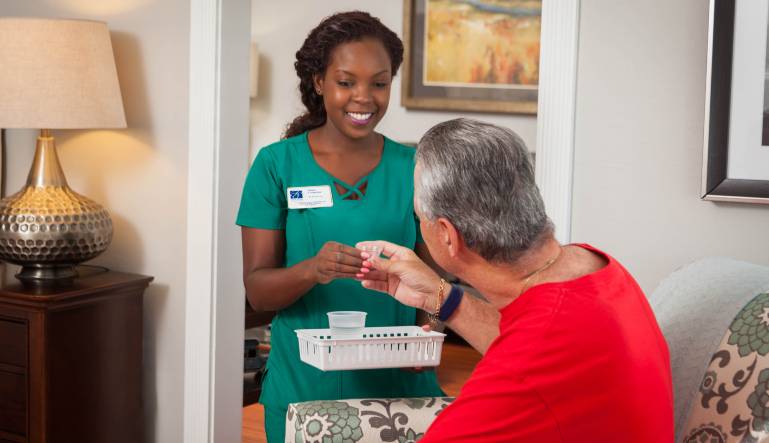Discover the advantages of Assisted Living as a senior care option.
Discover the advantages of Assisted Living as a senior care option.
Blog Article
Just How Assisted Living Facilities Enhance Quality of Life for Those With Dementia
Aided living facilities play a pivotal duty in enhancing the top quality of life for individuals with mental deterioration by executing customized care strategies that provide to their distinct requirements. These settings integrate organized activities with emotional support, cultivating a sense of neighborhood while guaranteeing security and self-reliance. The combination of engaging programs and household participation further enhances the citizens' experience. The intricacies of mental deterioration treatment proceed to advance, prompting a better exam of how these facilities adapt and innovate to satisfy the obstacles encountered by residents and their households. What ramifications does this have for future treatment versions?
Personalized Care Program
(Memory Care Facilities Charlotte)In a lot of cases, people with mental deterioration need tailored support that resolves their distinct demands and preferences. Customized treatment strategies are crucial in assisted living setups, as they ensure that each resident receives appropriate attention and services. These plans are developed collaboratively, involving healthcare professionals, caregivers, and family members to create a comprehensive overview of the individual's case history, cognitive capabilities, and personal interests.
A well-structured customized care plan usually includes particular goals associated with wellness monitoring, day-to-day activities, and social engagement. It accounts for the person's cognitive decrease while promoting independence and self-respect. Normal evaluations and updates to the care strategy are essential, as they permit adjustments based on the homeowner's advancing problem and preferences.
Trick parts of these plans typically include medication monitoring, behavioral support approaches, and dietary guidelines customized to the individual's needs (Memory Care). By concentrating on customized care, assisted living centers can promote a helpful environment that improves the lifestyle for people with dementia, inevitably contributing to their general health and happiness. This customized method values the uniqueness of each homeowner, ensuring they receive the thoughtful treatment they require

Engaging Tasks and Programs
Engaging citizens in meaningful tasks and programs is crucial for enhancing the lifestyle for individuals with mental deterioration. These tasks not only provide pleasure yet also promote cognitive feature and promote social communication, which can mitigate feelings of seclusion often experienced by citizens.

Furthermore, individualized programs are crucial in making certain that each citizen's special preferences and abilities are acknowledged. This tailored method encourages participation, enhances self-worth, and gives a feeling of success.
Additionally, routine evaluations of locals' rate of interests can assist staff change and adjust tasks to much better fit developing needs. By prioritizing interesting tasks and programs, helped living facilities can considerably improve the total experience and psychological health and wellness of people living with dementia.
Safe and Encouraging Setting
Producing a risk-free and supportive atmosphere is important for people with mental deterioration, as it directly impacts their health and lifestyle. Helped living facilities are made with certain features that advertise security while fostering a feeling of safety and comfort. These settings prioritize accessibility, with designs that reduce complication and motivate independence, permitting citizens to navigate their environments more conveniently.
Precaution, such as safe entrances and leaves, avoid straying and unauthorized accessibility, which are vital factors to consider for individuals with mental deterioration (Assisted Living). Team member are educated to recognize the special needs of homeowners, offering customized support and guidance to guarantee their safety. The incorporation of soothing shades and familiar objects can assist reduce anxiety and disorientation, producing a much more reassuring ambience.
Along with physical safety, emotional assistance is extremely important. Facilities usually utilize personnel Dementia Care Charlotte that are not just knowledgeable in caregiving yet likewise educated in empathy and communication, promoting trust fund and rapport with locals. This alternative strategy adds to a nurturing setting where people feel valued and understood, ultimately improving their general lifestyle.
Social Communication and Area
An encouraging environment not only prioritizes safety but also fosters opportunities for social interaction and community engagement, which are important for individuals with dementia. In nursing home, structured activities and communal spaces encourage residents to connect with each other, reducing sensations of seclusion usually experienced by those with cognitive problems.
Social communication plays a substantial function in improving emotional well-being and cognitive function (Memory Care). Engaging with peers in group activities such as video games, arts and crafts, or workout not only stimulates cognitive capabilities however also supports a feeling of belonging. Facilities commonly arrange events that promote socializing, permitting citizens to develop relationships and share experiences, which can be particularly beneficial for those with mental deterioration
Additionally, a lively community atmosphere can boost the general lifestyle for residents. Team members are trained to promote communications and support homeowners in developing meaningful links. By producing a culture of involvement, helped living facilities aid individuals with mental deterioration preserve social skills and boost their mood, inevitably adding to an extra satisfying life experience. This community-oriented approach is necessary in handling the obstacles related to dementia, advertising a sense of objective and continuity for homeowners.
Family Involvement and Assistance
Family participation is crucial in supporting people with dementia in assisted living atmospheres. Proactively involving family participants not only supplies psychological comfort to locals yet also promotes a feeling of belonging and connection in their lives. When households join care preparation and daily activities, they add beneficial insights regarding the person's choices, background, and needs, which can improve individualized treatment.
Moreover, routine household gos to can dramatically improve the emotional wellness of citizens, lowering sensations of isolation and anxiety. Relative can also help in maintaining cognitive function by engaging their loved ones in familiar conversations and activities. This interaction strengthens individuality and aids homeowners feel valued and comprehended.

Final Thought
To conclude, assisted living centers dramatically improve the high quality of life for individuals with mental deterioration via customized care strategies, involving activities, and a secure setting. These aspects foster cognitive stimulation, psychological wellness, and a sense of freedom. In addition, routine social interactions and solid family members participation contribute to purposeful links and emotional assistance. Collectively, these variables produce a holistic strategy to care that addresses the distinct demands of individuals with dementia, promoting total wellness and self-respect.
Report this page